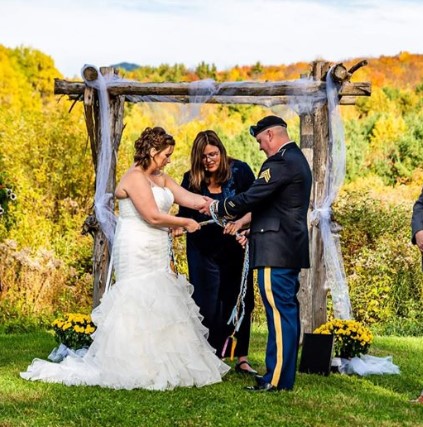Officiant on:
[Wikipedia]
[Google]
[Amazon]
 An officiant is someone who officiates (i.e. leads) at a service or ceremony, such as
An officiant is someone who officiates (i.e. leads) at a service or ceremony, such as
 An officiant is someone who officiates (i.e. leads) at a service or ceremony, such as
An officiant is someone who officiates (i.e. leads) at a service or ceremony, such as marriage
Marriage, also called matrimony or wedlock, is a culturally and often legally recognized union between people called spouses. It establishes rights and obligations between them, as well as between them and their children, and between ...
, burial
Burial, also known as interment or inhumation, is a method of final disposition whereby a dead body is placed into the ground, sometimes with objects. This is usually accomplished by excavating a pit or trench, placing the deceased and objec ...
, or namegiving
A given name (also known as a forename or first name) is the part of a personal name quoted in that identifies a person, potentially with a middle name as well, and differentiates that person from the other members of a group (typically a fa ...
/baptism
Baptism (from grc-x-koine, βάπτισμα, váptisma) is a form of ritual purification—a characteristic of many religions throughout time and geography. In Christianity, it is a Christian sacrament of initiation and adoption, almost inv ...
.
Religious officiants are usually ordained by a religious denomination as members of the clergy. Some officiants work within congregations in some denominations and for specified ceremonies (e.g. funerals), as non-ordained members on the clergy team. Clergy/officiants differ from chaplains
A chaplain is, traditionally, a cleric (such as a minister, priest, pastor, rabbi, purohit, or imam), or a lay representative of a religious tradition, attached to a secular institution (such as a hospital, prison, military unit, intellige ...
in that the clergy serve the members of their congregation, while chaplains are usually employed by an institution such as the military, a hospital or other health care facility, etc.
There may be more than one con-celebrant, but, even when a higher-ranking cleric is present, (save the Pope), there is only one principal celebrant.
Secular officiants include civil celebrants, Humanist Society–appointed officiants, Justices of the Peace
A justice of the peace (JP) is a judicial officer of a lower or ''puisne'' court, elected or appointed by means of a commission ( letters patent) to keep the peace. In past centuries the term commissioner of the peace was often used with the sa ...
, marriage commissioners, notaries
A notary is a person authorised to perform acts in legal affairs, in particular witnessing signatures on documents. The form that the notarial profession takes varies with local legal systems.
A notary, while a legal professional, is disti ...
, and other persons empowered by law to perform legal marriage ceremonies. Many secular celebrants/officiants conduct the whole range of ceremonies which mark the milestones of human life.
See also
*Celebrant (Australia)
In Australia, celebrants are people who conduct formal ceremonies in the community, particularly weddings, which are the main ceremony of legal import conducted by celebrants and for this reason often referred to as marriage celebrants. They ma ...
*Marriage officiant
A marriage officiant is a person who officiates at a wedding ceremony.
Religious weddings, such as Christian ones, are officiated by a pastor, such as a priest or vicar. Similarly, Jewish weddings are presided over by a rabbi, and in Islamic we ...
*Humanist officiant
A humanist celebrant or humanist officiant is a person who performs humanist celebrancy services, such as non-religious weddings, funerals, child namings, coming of age ceremonies and other rituals. Some humanist celebrants are accredited by humani ...
*Self-uniting marriage
A self-uniting marriage is one in which the couple are married without the presence of a third-party officiant. Although non-denominational, this method of getting married is sometimes referred to as a "Quaker marriage", after the marriage practi ...
*Justice of the Peace
A justice of the peace (JP) is a judicial officer of a lower or ''puisne'' court, elected or appointed by means of a commission ( letters patent) to keep the peace. In past centuries the term commissioner of the peace was often used with the sa ...
References